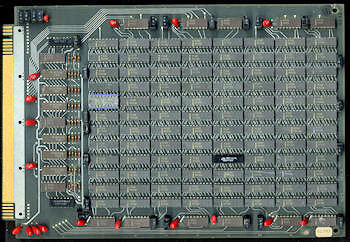Secrecy is the keystone of all tyranny
SHARE |
|
  Secrecy is the keystone of all tyranny
Secrecy is the keystone of all tyranny |
by Bill Degnan - 09/30/2007 14:58 |
|
The People's Computer Company and The Community Memory Project
Selected scans from the People's Computer Company March-April and May issues "Secrecy is the keystone of all tyranny" - this quote from the scifi novel Revolt in 2100 summarized the philosophy of Lee Felsenstein, Efrem Lipkin and the other founders of the Community Memory Project, according to the book Hackers by Steven Levy. The mission of Community Memory was to bring the power of computers to all citizens not just government officials and the sanctioned users in big companies with their IBM mainframes. Efrem and Lee took a donated XDS-940 computer "to the streets" by creating a community bulletin board system with remote terminals placed in community areas. Meetings of Community Memory were conducted in a small shopping center the California Bay Area. People could come to use the public computer terminals for whatever they wished making Community Memory host of one of the first public microcomputing centers, in a timesharing environment. Before the MITS Altair, computers used for microcomputing were available to very few persons and personal computers were almost unheard of. Ted Nelson, author of Computer Lib and Dream Machines was a frequent visitor to meetings. The Peoples Computer Company tabloid was started in 1972 by Bob Albrecht and others. Included in the PCC tabloid were pictures of events, program listings of BASIC programs and suggestions on buying computer parts. Lee Felsenstein occasionally wrote a hardware column for the PCC publication. As you might have guessed the Community Memory Project and The People's Computer Company were closely affiliated. The People's Computer Company was the birthplace of the Doctor Dobbs Journal. Reply |
|
Resources:

Popular Topics and FAQs
Past Issues:
Before we switched over to a blog format, past page archives here:
Vintage Computer Festival East 3.0 June 2006
Commodore B Series Prototypes July 2006
VOLSCAN - The first desktop computer with a GUI? Oct 2006
ROBOTS! - Will Robots Take Over? Nov 2006
Magnavox Mystery - a Computer, or? Jan 2007
The 1973 Williams Paddle Ball Arcade Computer Game Feb 2007
The Sperry UNIVAC 1219 Military Computer May 2007
VCF East 2007 - PET 30th Anniversary June/July 2007
The Electronic Brain August 2007
Community Memory and The People's Computer Company October 2007
Charles Babbage's Calculating Machine December 2007
Vintage Computing - A 1983 Perspective February 2008
Laptops and Portables May 2008
From Giant Brains to Hobby Computers - 1957 to 1977 August 2008
Historic Computer Magazines November 2008
World's Smallest Electronic Brain - Simon (1950) December 2008 - Feb 2009
Free Program Listings Spring 2009
Computer Music Summer 2009
Popular Electronics Jan/Feb 1975 - Altair 8800 Fall 2009
Early Microcomputer Mass Storage Summer 2010
Intel IA078 RAM top

This image was selected at random from the archive. Click image for more photos and files from this set.